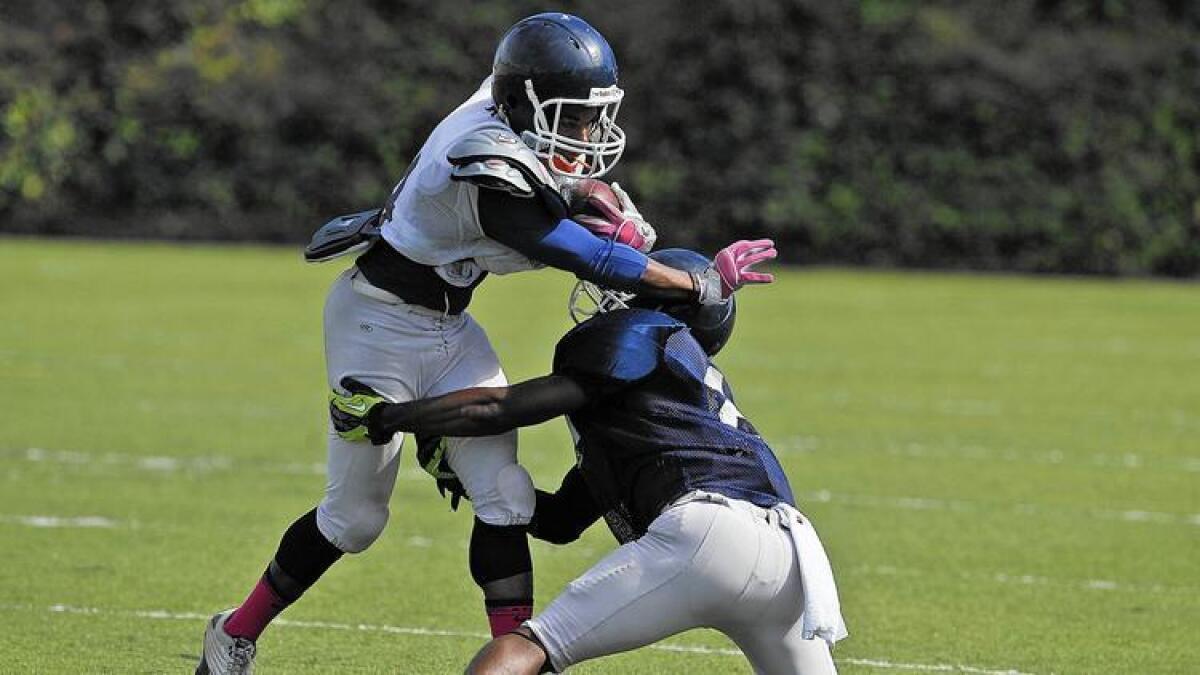A postseason competition ban for OCC draws support

Orange Coast College football players, as well as athletes competing for the school’s 23 other sports, may be banned from postseason contests in 2016-17.
One commissioner and one athletic director from conferences in which Orange Coast College competes, said that the one-year ban on postseason competition for all OCC sports teams in 2016-17 is an appropriate response to a pattern of violations in recent years.
Representatives for OCC, which began work Thursday on formulating its appeal to the California Community College Athletic Assn. the state governing body that issued the ban, contend that the violations were individual and separate cases. OCC also maintains that the majority of the violations were self-reported and incurred sanctions with which it has already complied.
OCC representatives have also stated that penalizing the entire athletic program unfairly punishes teams and student-athletes that have been operating completely within the rules.
“The sheer volume of transgressions got to the point where a slap on the hand was no longer appropriate,” said Irvine Valley Athletic Director Keith Shackleford, a member of the Orange Empire Conference that includes OCC.
“If you look at the philosophy of penalization, are the penalties meant to rehabilitate, or are they meant to penalize? We have been trying rehabilitation and it wasn’t working. Members of the conference talk about a culture of compliance and there didn’t seem to be one at Orange Coast. There is a perception of a lack of leadership at OCC that is at issue here and we are all painted with that negative brush, both within the conference and statewide. I’m not sure those in charge [at OCC] were nefarious as much as they were laissez-faire. But in our position, without compliance officers and associate athletic directors to help cut things off before they blossom into problems, we need to be more proactive as administrators.”
Shackleford said that previous sanctions levied to OCC by its conference were not very stringent. But, using a three-strikes analogy from the judicial system, punishment for violations looked at collectively should be more harsh.
Jim Sartoris, the commissioner of the Southern California Football Assn. that oversees 37 football programs grouped into leagues, said the OCC violations represent a trend that needs to be corrected.
“I understand it is a contentious point that programs that did not violate any of the constitution are having their athletes bear the brunt of [the sanctions],” Sartoris said. “But I think there is a point being made here by the other institutions that [Orange Coast] has to do a better job of oversight with its athletic program. Maybe [sanctions] are a way to get their attention, I don’t know.”
Sartoris said football violations reported after the 2014 season, for which sanctions had yet to be rendered, were the genesis of a CCCAA investigation that, combined with the previous issues involving OCC baseball, a handful of fall sports, and one specific eligibility case involving a football player in 2011, led to the postseason ban.
OCC baseball coach John Altobelli was suspended, per CCCAA conduct guidelines, late in the 2009 season after being ejected from a game for the third time.
In 2013, all fall sports teams were required to remove one contest from their schedule for having started preseason practices before the allowable date.
In 2014, the football program discovered that an ineligible player competed in eight games in the 2011 season. The violation, never revealed publicly by OCC, resulted in a one-year probation for the football program, and a ban on postseason play in 2014.
The latest football violations included an assistant coach who was with the program for one year providing extra benefits to players, such as transportation. The coach was dismissed due to the violations and no player who received benefits ever competed for the Pirates, said Michael Sutliff, the dean of kinesiology and athletics at OCC since July, 2012.
Altobelli was also suspended by the school for three games last month when it was learned that an ineligible player competed in one OCC loss. Since it happened recently, it was not mentioned among justification for the current sanctions, that include the entire athletic program being put on probation for two years, beginning next fall.
Sutliff said Thursday that he was surprised and disappointed by the one-year postseason ban.
“I don’t think the violations equate to a lack of institutional control,” Sutliff said. “Every time something occurred, we were forthright and addressed it by imposing our own sanctions or applying consequences to the team or coach. And we applied remedies to the situation to protect us from having that similar violation occur. All the things mentioned in the [CCCAA letter informing the school of the one-year postseason ban] have not been repeated, because the protections worked.”
Doug Bennett, OCC’s executive director of college advancement, said Thursday that the letter sent by the CCCAA last week would be released on Friday.
OCC women’s basketball coach Mike Thornton said he and his colleagues believe punishing the entire athletic program is overzealous.
“I’ve done some research and I think that it’s maybe the most unfair thing I’ve seen in sports,” said Thornton, who has guided his teams to the playoffs 22 times in his 27 seasons. “Our coaches want to stringently fight this. I’ve never been accused by anyone of violating any kind of rule and a lot of other coaches here feel the same way. My reputation might be challenged by this and that’s important to me.”
Only one of a handful of community college administrators polled Thursday said they could recall an instance in which an entire program has been penalized for violations involving individual sports. And the one instance was not cited specifically.
David Ridpath, an Ohio University assistant professor and one of the foremost experts on NCAA compliance issues, said there have been such cases at the NCAA level, primarily dealing with erroneous eligibility certification, or a systemic failure to meet benchmarks relating to academics or financial aid.
Ridpath also said that when an athletic program is on probation, a governing body is essentially putting the school on notice.
